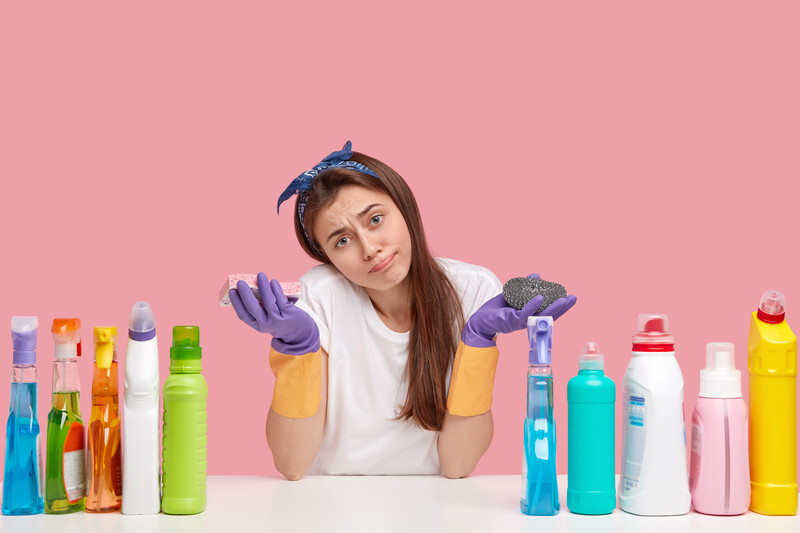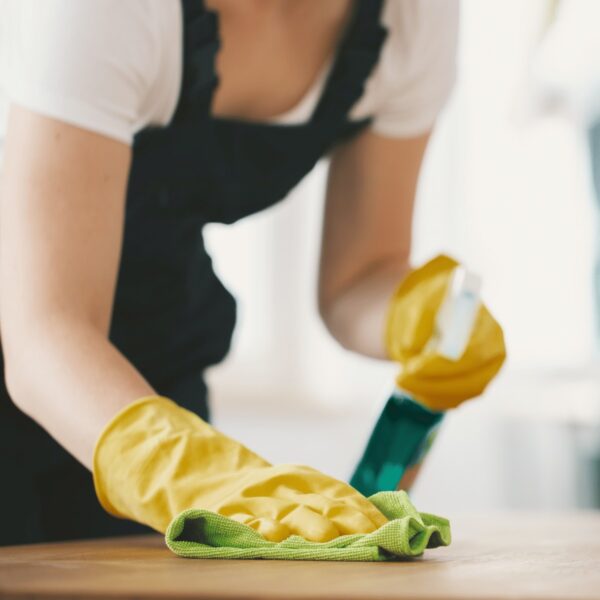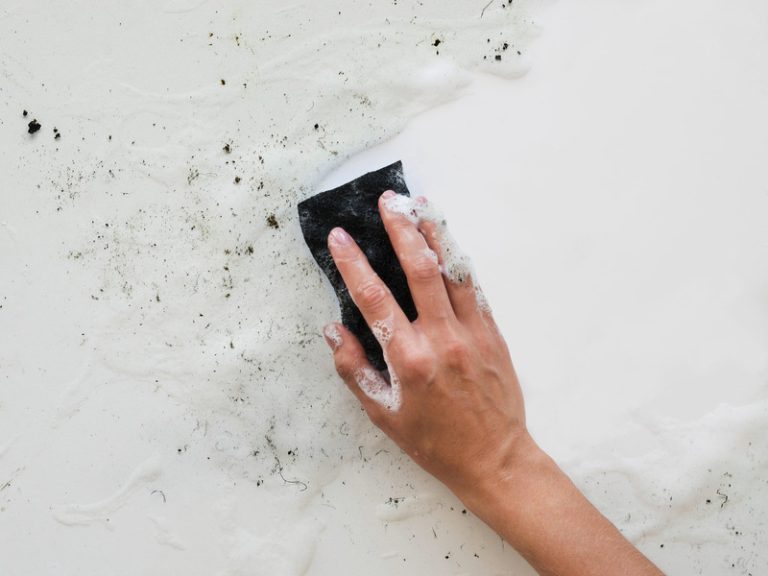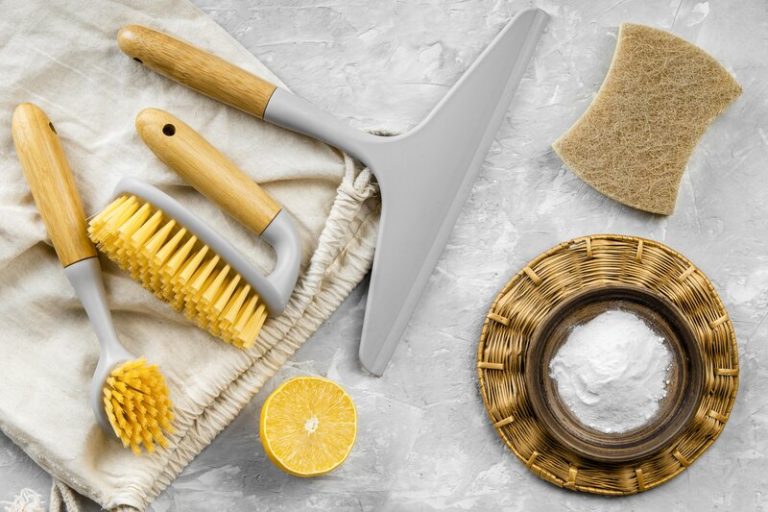Have you ever wondered when cleaning products expire? Or maybe, wondering how long are cleaning products good for. And, can you use expired cleaning products?
In this article, all these questions will be answered and we will explore the factors that affect the shelf life of cleaning products, the risks of using expired products, and how to tell if cleaning products are expired.
Learn more about how to read expiration dates on cleaning products and how long cleaning products last in this article.
How Long Do Cleaning Products Last?
The shelf life of cleaning products, such as household cleaning supplies, can vary depending on the type of product and its specific formulation. It is known that there are several factors that can help determine cleaning products’ expiration dates, ranging from their chemical composition and packaging to storage conditions and exposure to light or heat.
One crucial aspect that affects the shelf life of cleaning products is their chemical composition. The specific blend of ingredients can impact how stable the product remains over time, affecting its efficacy. For instance, organic ingredients may have a shorter shelf life compared to synthetic chemicals.
The packaging of cleaning products plays a vital role in preserving their quality. Properly sealed containers can prevent oxidation and contamination, prolonging the product’s effectiveness.
Can You Use Expired Cleaning Products?
While it is not recommended to use expired cleaning products, especially those containing potent chemicals, some individuals may still consider their usage. Doing so poses potential risks to both effectiveness and safety.
Expired cleaning products lose their efficacy over time, leading to reduced effectiveness in disinfecting surfaces and eliminating germs. In some cases, these products may also undergo chemical changes that can make them more hazardous to use. For instance, an expired bleach solution might not only fail to kill bacteria effectively but may also release toxic fumes when mixed with other cleaning agents. The expiry date serves as a crucial indicator of a product’s stability and performance, ensuring that it performs its intended function safely and effectively.
How to Tell If Cleaning Products Are Expired?
To determine do cleaning products expire or not, it is necessary to check various indicators, such as the expiry date stated on the packaging, observe changes in colour, smell, or consistency, and check for signs of contamination that may interfere with the efficacy of the product. Here’s the full explanation.
a. Check the Expiration Date
Always begin by checking the expiry date on the packaging of the cleaning product, as this date indicates the manufacturer’s recommended timeline for safe and effective use.
When looking for the expiry date, it is typically located on the back or bottom of the product packaging. It is vital to closely follow the expiry guidelines to guarantee optimal cleaning results and minimise any risks associated with expired products. Embracing this practice will enhance the effectiveness of your cleaning routine and maintain a healthy living environment.
b. Look for Changes in Colour, Smell, or Consistency
Inspect the cleaning solution for any noticeable changes in colour, odour, or texture, as alterations in these characteristics can signify degradation or contamination that may render the product ineffective or potentially harmful.
When examining the colour, watch out for any unusual darkening, cloudiness, or discolouration, which may indicate the presence of impurities or chemical reactions. Likewise, a strong, off-putting smell that is different from the original scent could suggest bacterial growth or spoilage within the solution.
The texture of the cleaning solution should remain consistent throughout its use. Any signs of separation, clumping, or the formation of sediments point towards a breakdown in the product’s integrity.
c. Check for Any Visible Signs of Contamination
Examine the cleaning solution for any visible signs of contamination, such as mould growth, sedimentation, or discolouration, as these indications suggest that the product may have been compromised and should not be used.
It is crucial to pay attention to these telltale signs because using contaminated cleaning solutions can lead to a range of health hazards and reduced effectiveness in cleaning.
Prolonged exposure to mould or other contaminants in cleaning products can trigger allergic reactions, respiratory issues, or skin irritation. Using a compromised solution may not disinfect surfaces effectively, leaving behind harmful germs and bacteria.
What Happens if We Use Expired Cleaning Products or Chemicals?
Using expired cleaning products or chemicals can result in reduced effectiveness in cleaning tasks, as the degraded formulations may struggle to eliminate germs and pathogens effectively. There is a risk of exposing individuals to potential health hazards due to the compromised nature of the expired products.
When expired cleaning solutions are used, there is a significant chance that surfaces will not be thoroughly sanitized, leading to a false sense of cleanliness. This can result in a breeding ground for bacteria and viruses, ultimately defeating the purpose of cleaning. The chemical composition of expired products may change over time, posing risks like skin irritation, respiratory issues, or even chemical burns when in contact with skin or eyes.
Examples of negative outcomes from using expired cleaning products include mould growth due to ineffective mould removers, streaks and residue left behind by expired glass cleaners, or disinfectants losing their potency against harmful pathogens. In some severe cases, individuals may experience allergic reactions or poisoning from the use of outdated chemical solutions.
How to Properly Dispose of Expired Cleaning Products?
Proper disposal of expired cleaning products is crucial to prevent environmental contamination and safeguard human health. It is essential to follow local guidelines or contact waste management services for safe and eco-friendly disposal methods.
When cleaning products reach their expiry date, they can lose their effectiveness and potentially become harmful if not disposed of properly. Empty containers and leftover products should not be thrown away with regular household waste as they may contain chemicals harmful to the environment.
To dispose of expired cleaning products safely, check for local recycling centres that accept household hazardous waste. Many communities have designated drop-off locations or collection events where you can bring these items for proper disposal.
What Are Some Tips for Properly Storing Cleaning Products?
To help maintain its effectiveness and prolong its life, here are some cleaning product storage tips that you can apply:
a. Keep Products in Their Original Containers
Maintaining cleaning products in their original containers is essential to prevent accidental spills, misidentification, or exposure to external contaminants. The original packaging often provides vital information on usage and safety precautions.
Retaining cleaning products in their original packaging not only helps prevent potential hazards but also ensures that the integrity of the containers is maintained, reducing the risk of leaks and spills. By storing products in their original packaging, individuals can easily refer to the manufacturer’s instructions and safety guidelines in case of any queries or emergency situations. This practice also helps in keeping the products away from incompatible substances, preserving their efficacy and longevity.
b. Store in a Cool, Dry Place
Storing cleaning products in a cool, dry place helps maintain their stability and effectiveness over time by minimising exposure to heat, humidity, or direct sunlight. Proper climate control can extend the shelf life of products.
When exposed to high temperatures, cleaning agents may lose their efficacy and even change chemical composition, rendering them less efficient in their intended purpose. Moisture can lead to product degradation, resulting in a shorter lifespan. By keeping cleaning products in a cool and dry environment, you can ensure that they remain potent and deliver optimal results when needed. In essence, the right storage conditions can not only save you money by preserving the effectiveness of your cleaning supplies but also contribute to a healthier and cleaner living environment.
c. Keep Out of Reach of Children and Pets
To ensure household safety, it is crucial to store cleaning products out of the reach of children and pets. Securing these items in high or locked cupboards can prevent accidental ingestion or exposure to harmful chemicals.
Children and pets are naturally curious and may mistake colourful cleaning products for toys or food, leading to dangerous consequences. Unintended contact with harsh chemicals in cleaning solutions can cause skin irritation, respiratory issues, or even more severe health complications.
Implementing safety measures such as using childproof caps on bottles, labelling containers clearly, and storing products in their original packaging can help mitigate the risks of accidental exposure.
Similarly, this is a complete explanation of how long does cleaning solution lasts. From the explanation above, you certainly already know do cleaning products expire or not.
If you want to ensure your space is always spotless and hygienic, let TEKA Cleaning handle it for you. For homeowners, our house cleaning services guarantee a fresh and inviting living environment. Business owners can benefit from our comprehensive commercial cleaning or specialised cleaning services, tailored to meet the unique needs of your enterprise.
Planning a move? Our end of tenancy cleaning will leave your property in pristine condition. Additionally, our expert carpet cleaning services will rejuvenate your carpets, making them look as good as new.
Ready to experience professional cleaning? Contact TEKA Cleaning today! Book now or give us a call at 01233 751 544 to arrange your service.
Read also:











